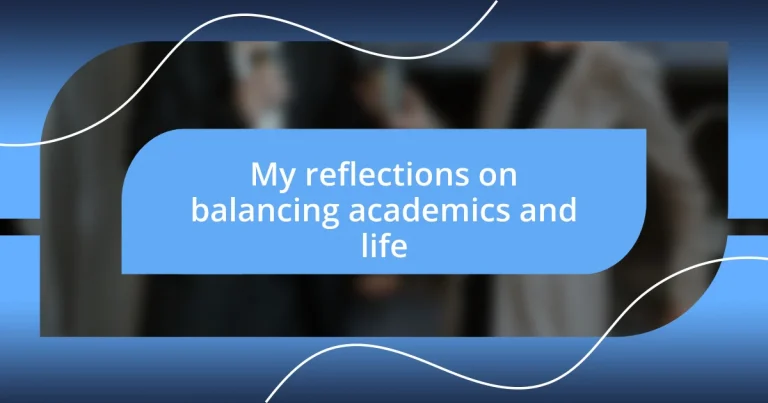Key takeaways:
- Acknowledging and openly discussing academic pressures is essential for well-being and fostering connections.
- Defining personal priorities and creating a balanced schedule enhances focus, productivity, and overall happiness.
- Regularly evaluating progress and adjusting goals based on insights leads to improved academic performance and better life balance.
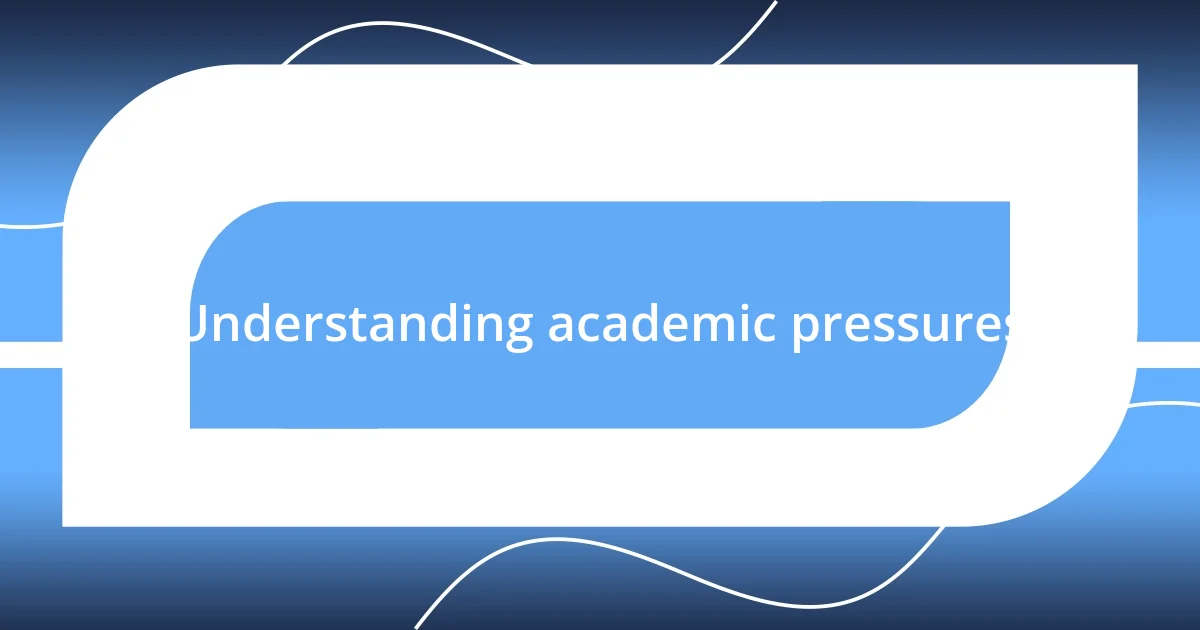
Understanding academic pressures
Academic pressures can feel overwhelming at times, can’t they? I remember sitting in my dorm room, books spread across my desk, grappling with multiple deadlines. It was that intense moment when it dawned on me how the weight of expectations—both self-imposed and from professors—could cloud my outlook and dampen my spirit.
At times, I found myself questioning whether the pursuit of good grades was worth the sacrifice of my sanity. It’s like a treadmill that never stops; the faster you run, the more demands shoot up on the horizon. Stress from exams and assignments often seeped into my personal life, leading to sleepless nights and skipped meals. I often wondered, is this really what education is supposed to feel like?
As I navigated through these challenges, I discovered that acknowledging academic pressure was crucial for my well-being. The burden of comparison with peers often made me feel isolated, but opening up about my struggles fostered genuine connections. Have you ever felt the pressure to excel so intensely that you lost sight of the joy of learning? Trust me, you’re not alone in this journey.
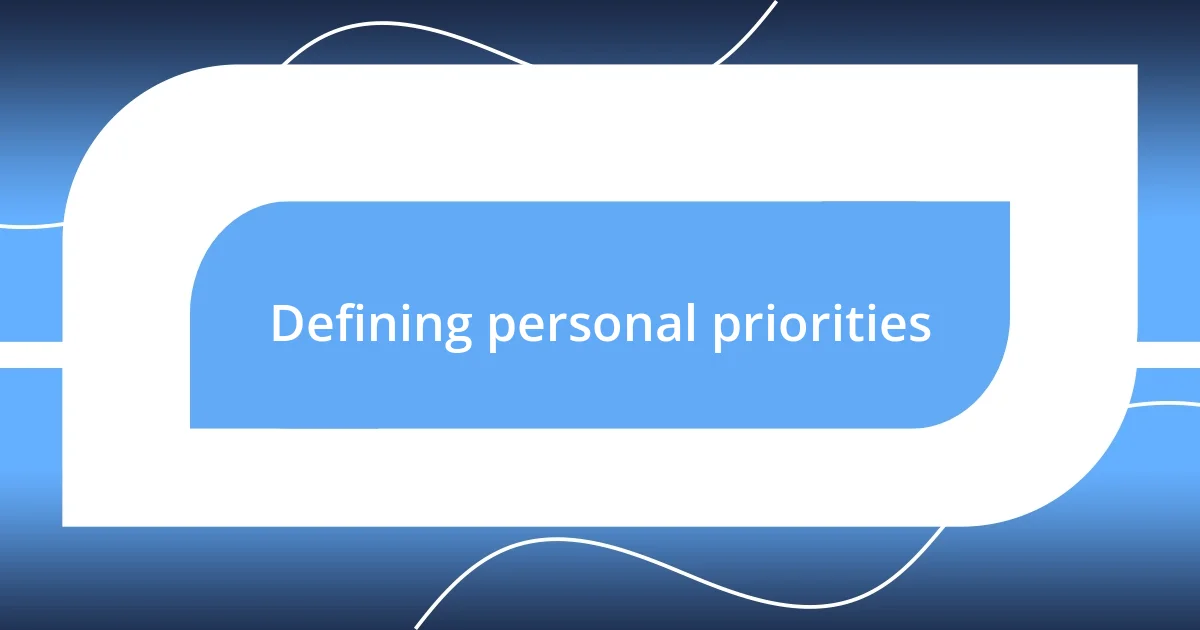
Defining personal priorities
Defining my personal priorities became a turning point in my journey. There were days when I was overwhelmed with assignments, leading me to miss out on important family gatherings or time with friends. I realized that for each grade I chased, I was potentially trading away moments that truly mattered. When I finally sat down to assess what was non-negotiable in my life, things started to shift.
To help clarify my priorities, I created a simple but effective list that has since been my anchor:
- Family time: Prioritizing bonds with loved ones keeps me grounded.
- Health: I learned that maintaining physical and mental well-being is essential for sustainable success.
- Social connections: Investing in friendships enriches my life and provides needed support.
- Academic goals: While important, they take a back seat to experiences that nourish my soul.
- Personal growth: Engaging in hobbies and interests fuels my creativity and happiness.
This exercise not only illuminated what I value but also helped create a balance between my academic responsibilities and personal life.
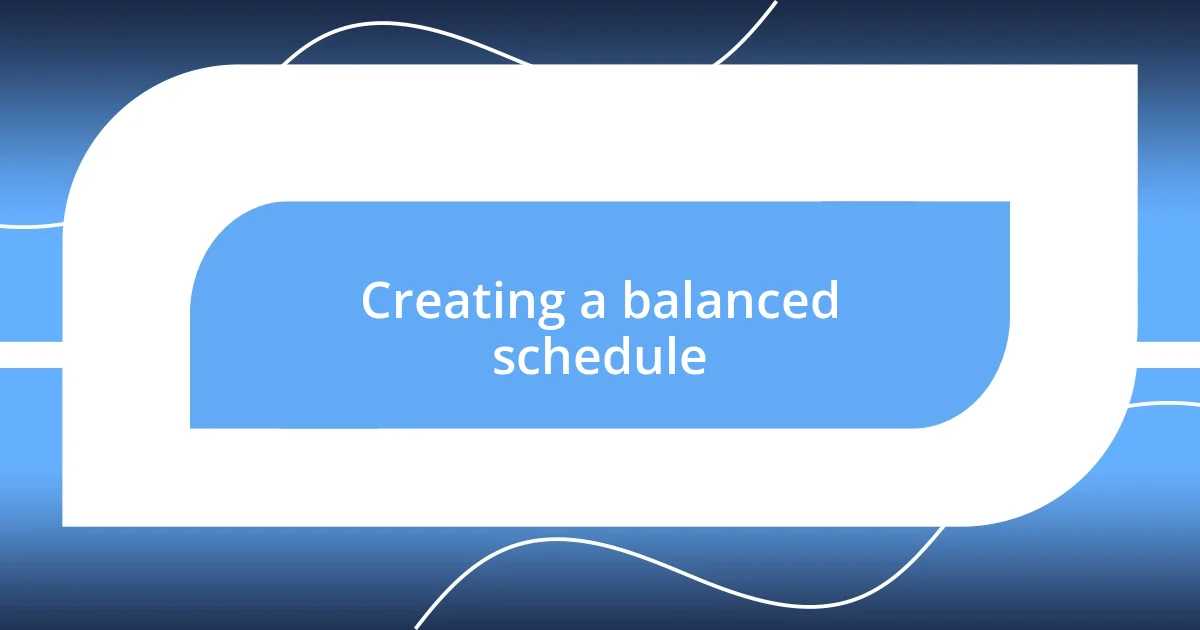
Creating a balanced schedule
Creating a balanced schedule has often felt like walking a tightrope. I discovered that mapping out my days in advance worked wonders for my mental clarity. By using a planner, I could visualize where academic commitments overlapped with personal time, allowing me to allocate slots for studying, social activities, and self-care. I remember a week when I overbooked myself studying late into the night, missing out on a friend’s birthday dinner. That experience was a wake-up call for me.
I learned to embrace flexibility within structure; things don’t always go as planned. For instance, if a study session extends longer than expected, I allow myself a buffer the next day to catch up on sleep or work out. Just the other day, I had a midterm and had to recalibrate my schedule. Instead of cramming mindlessly, I divided my study material into manageable chunks and included breaks to recharge. It made all the difference—I felt more energized and focused.
One effective strategy I’ve adopted is the “time-blocking” technique. You dedicate specific time slots for tasks while incorporating breaks, which I found to be essential. I often include 25-minute focused study sessions followed by a 5-minute break, known as the Pomodoro Technique. This approach helps me maintain peak productivity without feeling burnt out. I often reflect on how this balance has improved both my academic performance and my overall happiness.
| Time Allocation | Benefits |
|---|---|
| Study Time | Improves focus and retention. |
| Personal Time | Enhances emotional well-being. |
| Breaks | Prevents burnout and boosts productivity. |
| Flexibility | Allows adaptation to unexpected changes. |
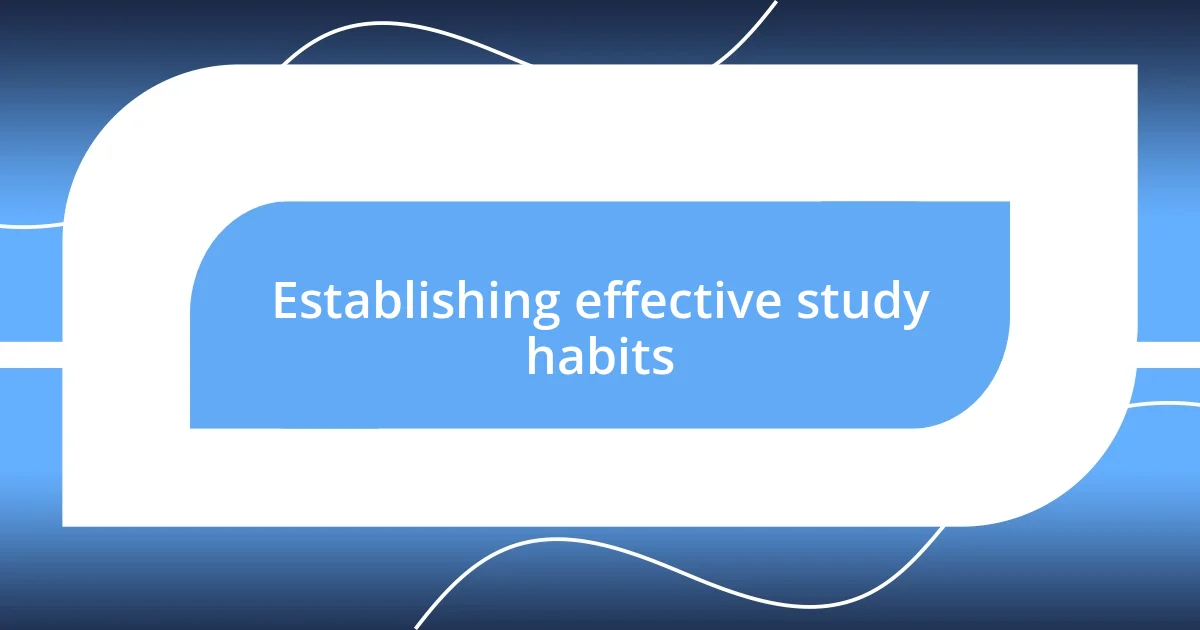
Establishing effective study habits
Establishing effective study habits is like setting the groundwork for a fulfilling academic life. One method that’s really helped me is consistently finding a specific study environment. Whether it’s the local library’s quiet corner or my cozy coffee shop, being in a place where I feel comfortable and focused has made a huge difference. When I recall those chaotic nights at home, distracted by endless TV shows or phone notifications, I can’t help but shake my head. Have you ever noticed how your surroundings can either propel you forward or hold you back?
Additionally, I’ve come to appreciate the importance of setting clear, achievable goals for each study session. Instead of telling myself, “I’ll study for three hours,” I now define specific objectives like “I will complete chapter five and solve related problems.” This not only keeps me more motivated but also gives me a sense of accomplishment once I tick those tasks off my list. There’s something incredibly satisfying about seeing progress in tangible terms, isn’t there?
Lastly, I have learned to listen to my body and mind. If I’m feeling restless, rather than pushing through, I take a quick walk or practice mindfulness for a few minutes. I remember one evening when I forced myself to study despite feeling sluggish. It turned into a waste of time, as my mind kept wandering. In contrast, when I’ve allowed myself these breaks, my focus would sharpen dramatically upon returning. By prioritizing my well-being during study hours, I not only enhance my productivity but also my overall enjoyment of learning.
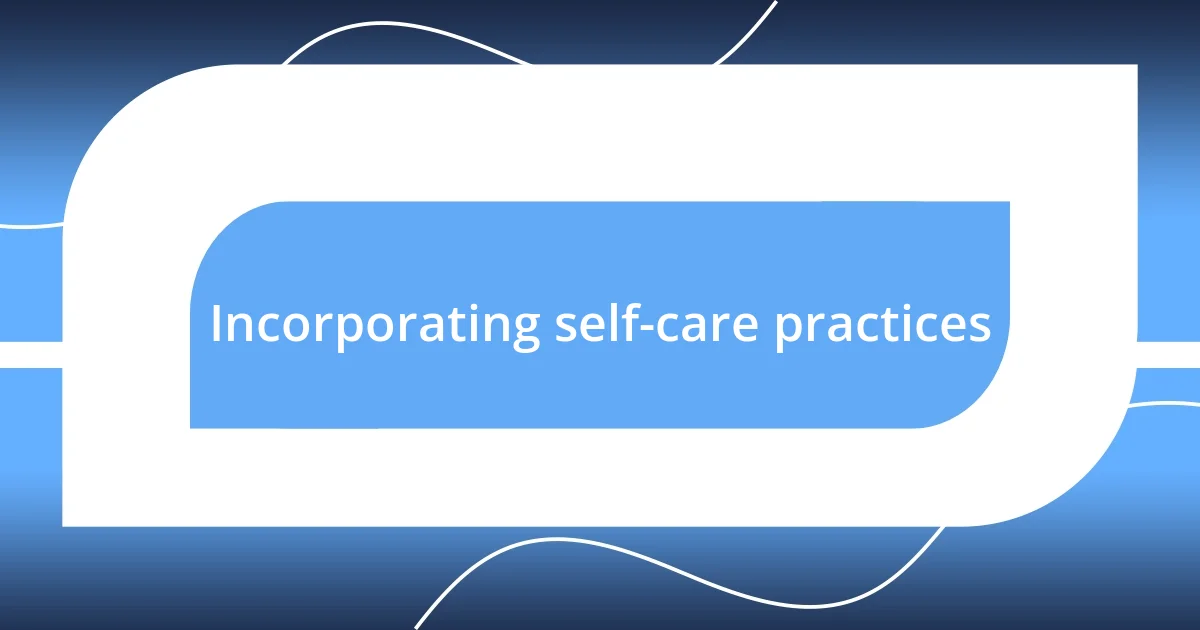
Incorporating self-care practices
Incorporating self-care practices into my routine has been a game-changer. For me, it’s all about recognizing that taking a break doesn’t mean slacking off. I remember one particularly grueling week when I thought powering through my studies without rest would boost my performance. However, I ended up feeling foggy and unproductive. After that experience, I promised myself to prioritize self-care, whether it’s through a quick meditation session or simply savoring a cup of tea.
One of my favorite self-care activities is exercising. I’ve found that just a brisk, 30-minute walk can refresh my mind and lighten my mood. I vividly recall a time when I had a particularly tough exam coming up. Instead of cramming all night, I stepped outside for a walk, letting my thoughts flow freely. That little escape reinvigorated me, unveiling ideas I hadn’t considered earlier. It’s fascinating how stepping away can lead to breakthroughs, isn’t it?
Creating small rituals also plays a significant role in my self-care journey. Incorporating simple acts like journaling or disconnecting from my phone before bed has profoundly impacted my nighttime routine. I often spend a few minutes writing down my thoughts or reflections before sleep, which calms my racing mind. I genuinely cherish those moments—they not only help me unwind but also foster clarity for the next day. What small rituals have you considered to improve your self-care practices?
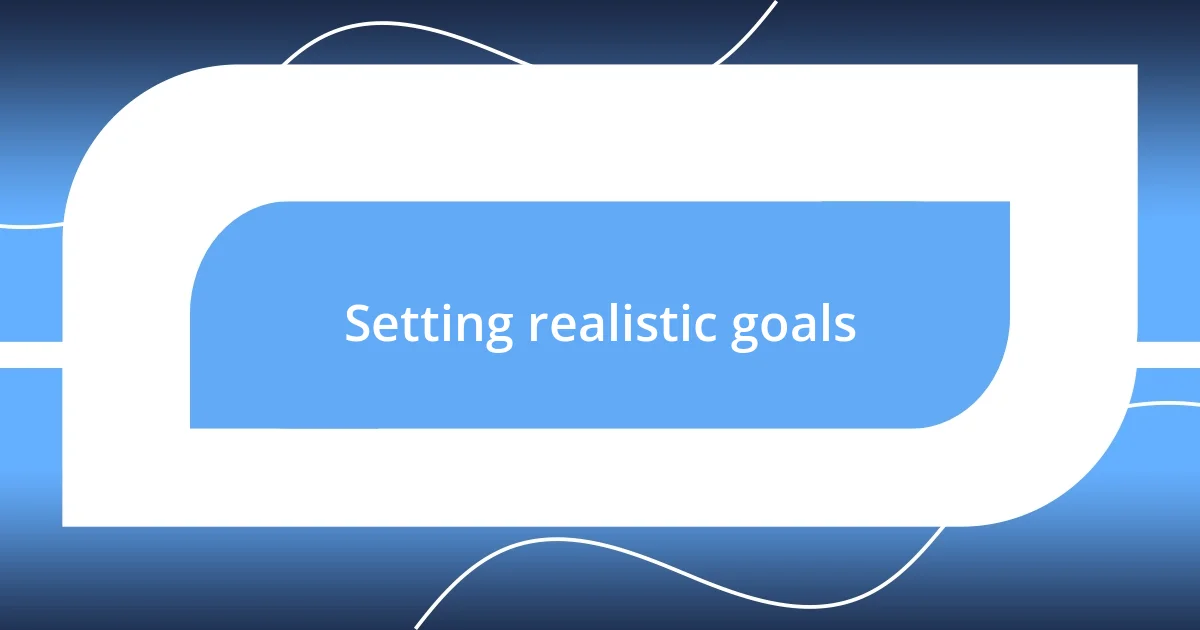
Setting realistic goals
Setting realistic goals is something that I’ve learned is crucial for maintaining balance in academics and life. I used to aim high, often setting broad, ambitious targets without considering my schedule. For instance, I once thought I could cram an entire semester’s worth of material into one weekend, which was both unrealistic and overwhelming. Have you ever been caught in a similar trap?
Now, I focus on breaking my goals into bite-sized pieces. When preparing for exams, I’ll structure my study material over several weeks, tackling a chapter or two each day rather than attempting to absorb everything at once. This approach not only reduces stress but also makes learning feel more manageable. I remember how enlightening it was to see significant improvement when I shifted from “study the whole course” to “review chapters three and four today.” It’s amazing what a little differentiation can do, isn’t it?
I also emphasize flexibility in my goal-setting. My life isn’t rigid, and neither are my academic commitments. There are days when unexpected events arise—like a surprise family visit or a work obligation. Embracing a willingness to adjust my goals helps me maintain balance without guilt. I recall a day when a last-minute project shifted my study schedule; instead of getting frustrated, I allowed myself to adapt. It turned out to be a refreshing reminder that life is dynamic, and my goals should reflect that reality. How do you adapt your goals when life throws a curveball? Reflecting on that can lead to even better strategies moving forward.
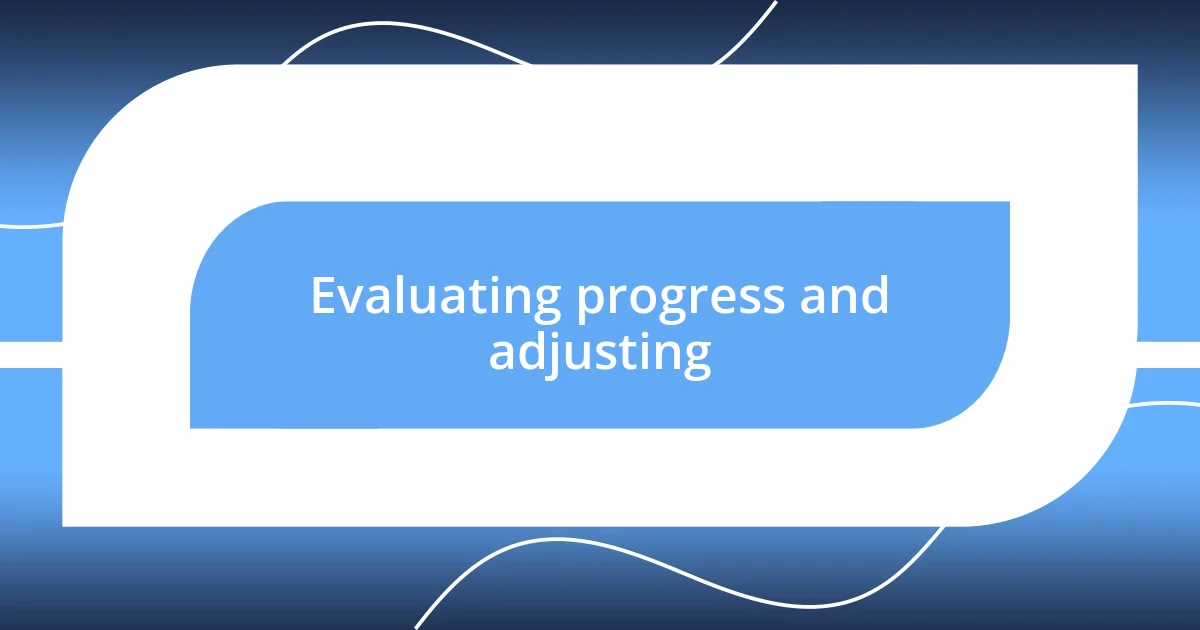
Evaluating progress and adjusting
Evaluating my progress regularly has proven essential for staying balanced between academics and life. I often set aside time each week to reflect on what went well and where I struggled. One evening, I found myself sifting through my notes after a series of hectic days. As I reviewed my week, I noticed a pattern of burnout emerging every time I neglected my personal time. That realization hit me; understanding my stress levels was vital for making improvements.
Adjusting my strategies based on my reflections has transformed my approach to challenges. I remember a time when my grades began to slip during midterms, and after evaluating my schedule, I realized I was dedicating too much time to social events and not enough to study sessions. Rather than feeling defeated, I recalibrated my priorities, carving out dedicated study hours and even incorporating study groups. How valuable it feels to see those adjustments pay off in my grades!
It’s a constant journey of fine-tuning my routines. I’ve learned that some adjustments are immediate, like altering my study location or changing my focus technique. Other changes take time, such as learning to say no to extra activities that don’t align with my academic goals. Reflecting on these moments, I can’t help but feel a sense of empowerment. It’s incredibly rewarding to know that I have the ability to adapt and grow in both my studies and life. What have been your own experiences in evaluating and adjusting your progress?












